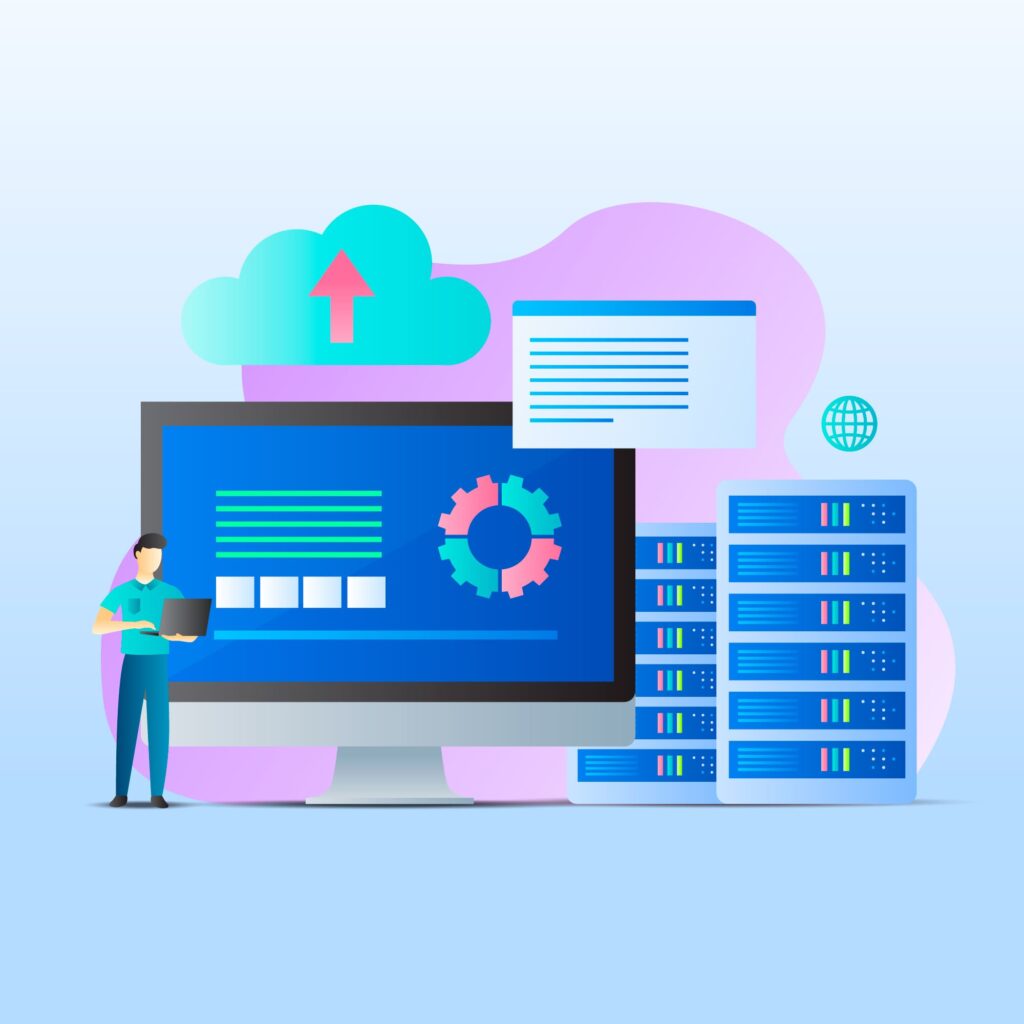Introduction
Microsoft SQL Server is a robust and versatile relational database management system (RDBMS) developed by Microsoft. It is widely used across industries for managing and storing data efficiently, making it a key player in today’s data-driven world. From small startups to large enterprises, organizations rely on SQL Server to handle their data storage, processing, and analytics needs with precision and reliability.
One of the primary reasons for its widespread adoption is its ability to adapt to a variety of use cases. Whether you’re building a simple application for inventory management or a complex system for enterprise resource planning, SQL Server provides the tools and performance required to succeed. Its scalability ensures it can grow with your business, handling increasing volumes of data without compromising speed or efficiency.
Additionally, SQL Server is praised for its integration skills. As part of the Microsoft ecosystem, it seamlessly connects with other tools like Power BI for data visualization, Azure for cloud storage, and Office 365 for business applications. This synergy allows organizations to create end-to-end solutions that streamline operations and enhance productivity.
Security is another standout feature of Microsoft SQL Server. In an age where data breaches are a significant concern, SQL Server offers advanced features like Always Encrypted, role-based access controls, and auditing mechanisms to safeguard sensitive information. These features ensure compliance with industry standards and provide peace of mind to businesses handling critical data.
Moreover, SQL Server supports advanced analytics and artificial intelligence (AI) integrations. With built-in support for machine learning and data mining, it empowers businesses to extract valuable insights from their data. This capability is particularly crucial for staying competitive in industries like finance, healthcare, and e-commerce, where data-driven decision-making is key to success.
This article provides a detailed overview of Microsoft SQL Server, diving into its features, benefits, and why it remains a preferred choice for businesses globally. By the end, you’ll understand why SQL Server continues to be a cornerstone of modern database management systems.

What is Microsoft SQL Server?
At its core, Microsoft SQL Server is a database software designed to handle large volumes of structured data. It supports a variety of operations, from simple data queries to complex data analytics, ensuring businesses can store, access, and analyze data seamlessly. But what truly sets Microsoft SQL Server apart is its versatility and scalability, making it a go-to solution for businesses of all sizes.
SQL Server serves as the foundation for many applications, enabling efficient data administration and retrieval. Whether you’re dealing with a customer relationship management (CRM) system, an e-commerce platform, or an enterprise-level data warehouse, SQL Server provides the tools to organize and manipulate data effectively. Its ability to handle structured, semi-structured, and unstructured data makes it a comprehensive solution for diverse business needs.
One of the unique aspects of SQL Server is its support for a wide range of operations, including transactional processing, business intelligence, and advanced analytics. For instance, businesses can use SQL Server to process daily transactions swiftly while simultaneously running complex queries to extract insights from the same dataset. This dual capability ensures that organizations can make real-time decisions without sacrificing long-term strategic analysis.
Moreover, SQL Server offers seamless integration with other Microsoft products, such as Azure for cloud storage, Power BI for data visualization, and Excel for familiar spreadsheet functionalities. This integration simplifies workflows and empowers users to leverage their data more effectively. It also supports hybrid environments, enabling organizations to maintain on-premises databases while leveraging cloud-based solutions for scalability.
From a technical perspective, SQL Server supports advanced features like in-memory processing, Always On Availability Groups for high availability, and PolyBase for handling big data. These innovations enable businesses to keep up with the growing demands of modern data processing and analytics.
In essence, Microsoft SQL Server is more than just a database; it is a comprehensive data platform that empowers businesses to innovate, optimize operations, and stay competitive in an increasingly data-driven world.
The Evolution of Microsoft SQL Server
SQL Server was first introduced in 1989 as a joint venture between Microsoft, Sybase, and Ashton-Tate. Initially designed for IBM OS/2, it transitioned to Windows in the 1990s, aligning with Microsoft’s focus on creating enterprise-grade solutions for its rapidly growing ecosystem. This move not only made SQL Server more accessible but also positioned it as a core component of Microsoft’s suite of business tools.
The 2000s marked a significant turning point for SQL Server with the release of SQL Server 2000, which introduced features like indexed views and XML support, making it a pioneer in integrating modern data handling capabilities. This version set the stage for the later inclusion of business intelligence tools, solidifying SQL Server’s role as more than just a database—it became a comprehensive data management solution.
With the launch of SQL Server 2012, Microsoft introduced Always On Availability Groups, significantly enhancing high availability and disaster recovery. Over subsequent releases, the platform evolved to incorporate in-memory processing, advanced analytics, and robust cloud integration through Microsoft Azure.
Today, SQL Server supports hybrid environments, artificial intelligence, and big data, cementing its place as one of the most versatile and reliable RDBMS platforms in the world, continually adapting to the needs of modern businesses.
Key Features of Microsoft SQL Server
Security
Microsoft SQL Server is renowned for its robust security framework. Features like Transparent Data Encryption (TDE), Always Encrypted, and role-based access controls ensure sensitive data remains protected.
High Performance and Scalability
With in-memory technologies and support for large-scale workloads, SQL Server delivers exceptional performance, whether handling small applications or massive enterprise systems.
Integration with Microsoft Ecosystem
Seamless integration with other Microsoft tools like Azure, Power BI, and Office 365 allows users to extend SQL Server’s capabilities for data visualization and cloud computing.
User-Friendly Interface
SQL Server Management Studio (SSMS) offers an intuitive interface for managing databases, making it accessible for both beginners and seasoned developers.
SQL Server Editions
Microsoft offers various editions of SQL Server tailored to different business needs:
- Express Edition: A lightweight, free version for small-scale applications.
- Standard Edition: Suitable for medium-sized organizations, offering advanced features at a moderate cost.
- Enterprise Edition: Packed with premium features, this version is designed for large-scale enterprises requiring high-end performance.
SQL Server Components
SQL Server comprises several key components, each serving a specific purpose:
- Database Engine: Handles core database functions like storage, processing, and security.
- SQL Server Management Studio (SSMS): A comprehensive tool for managing and configuring databases. like storage, processing, and security.
- SQL Server Agent: Automates routine tasks like backups and scheduling.
- Reporting Services (SSRS): Facilitates the creation of detailed business reports.
- Analysis Services (SSAS): Facilitates data mining and multidimensional analysis.
Advantages of Using Microsoft SQL Server
- Reliable Data Management
SQL Server is a trusted platform for storing and retrieving data efficiently, ensuring data integrity across applications. - High Availability
Features like Always On Availability Groups provide fault tolerance and disaster recovery, minimizing downtime. - Cloud Integration
SQL Server integrates effortlessly with Azure, enabling businesses to scale operations in a cost-effective cloud environment.
Common Use Cases for SQL Server
- Enterprise Applications: Manage complex business processes with robust database solutions.
- Data Warehousing: Store and analyze large datasets for actionable insights.
- Business Intelligence: Use SQL Server’s analytical tools to make data-driven decisions.
Challenges of Using SQL Server
While SQL Server is a powerful tool, it does come with certain challenges:
- Cost: Licensing can be expensive, especially for the Enterprise edition.
- Learning Curve: The many functionality may be intimidating for new users.
Optimizing SQL Server Performance
- Use Indexes: Proper indexing speeds up query execution.
- Optimize Queries: Avoid redundant queries to enhance database performance.
- Regular Maintenance: Perform routine checks to ensure databases run smoothly.
Future of Microsoft SQL Server
The future of SQL Server is aligned with trends like artificial intelligence, machine learning, and cloud-first strategies. Microsoft continues to innovate, offering AI-integrated features and expanding its cloud capabilities to meet evolving business needs.
Conclusion
Microsoft SQL Server is more than just a database management tool—it’s a comprehensive solution that empowers businesses to manage, analyze, and derive value from their data. Its extensive feature set, including high-performance processing, robust security measures, and advanced analytics capabilities, makes it a powerful asset in any organization’s technology stack.
One of its standout qualities is its adaptability. Whether you’re a small business managing modest data requirements or a multinational corporation handling vast, complex datasets, SQL Server scales effortlessly to meet your needs. The ability to integrate seamlessly with the Microsoft ecosystem, including Azure for cloud services and Power BI for data visualization, enhances its utility, making it a central hub for modern data operations.
Additionally, SQL Server continues to evolve with technological advancements, keeping pace with emerging trends like artificial intelligence, machine learning, and cloud-based solutions. These innovations ensure that businesses using SQL Server stay competitive and future-ready in an ever-changing landscape.
In a world driven by data, Microsoft SQL Server is not just a tool but a strategic advantage. Its reliability, performance, and forward-thinking design make it an invaluable choice for organizations looking to unlock the full potential of their data. For businesses seeking growth and efficiency, SQL Server is a clear winner.
FAQs
1. What is the difference between SQL Server and MySQL?
SQL Server is a Microsoft product offering enterprise-grade features, while MySQL is an open-source solution often favored for small to medium-scale projects.
2. Is SQL Server free to use?
The Express edition of SQL Server is free, but other editions require licensing.
3. Can SQL Server handle big data?
Yes, SQL Server supports big data analytics through features like PolyBase and integration with Azure Data Lake.
4. What is SSMS in SQL Server?
SQL Server Management Studio (SSMS) is a database management tool that provides an easy-to-use interface for operations such as querying and setting.
5. How does SQL Server integrate with Azure?
SQL Server integrates with Azure through services like Azure SQL Database and hybrid cloud capabilities, allowing businesses to scale and manage data efficiently.

